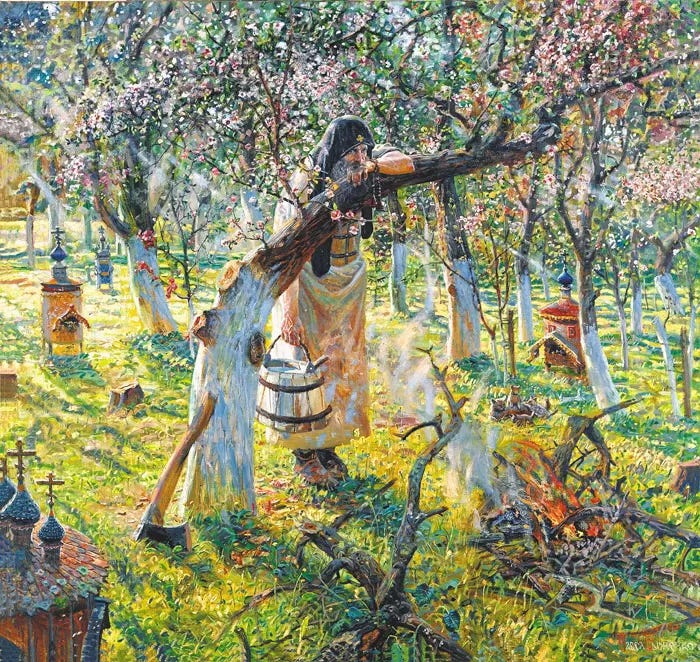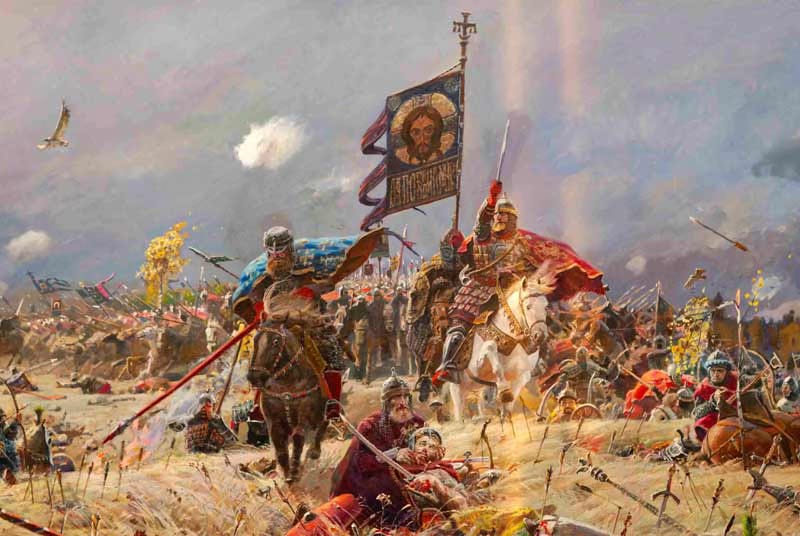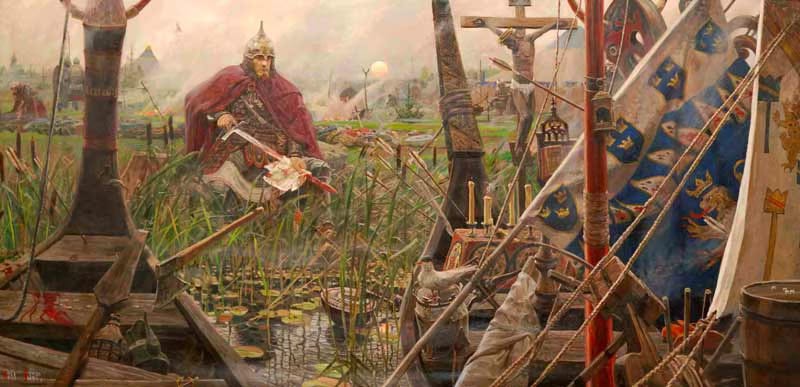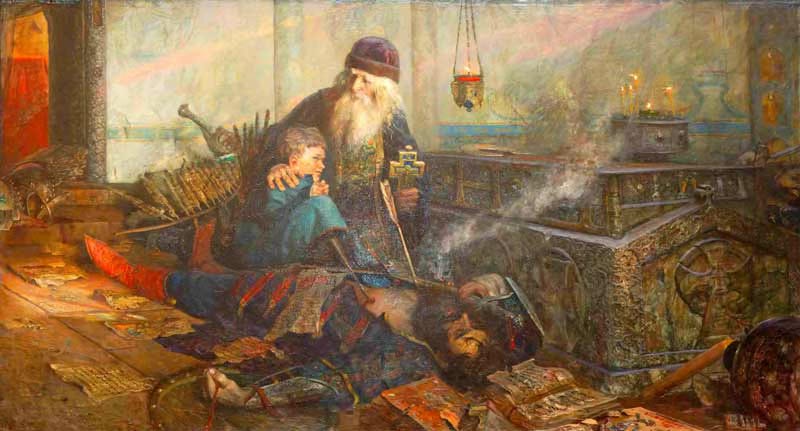Is Patriotism the Same as Nationalism?
Ivan Ilyin's wisdom after a life chasing the ghost of nationalism
Happy Fourth of July to my American friends! Is it just me, or are there more loud opinions about American exceptionalism, patriotism, and July 4 out there than at any point in the near past?
A good thing, I think, even if I disagree with much of what I read. Generally, I try not to get involved in political debate on social media. Especially since there are better ways of talking politics these days, as exemplified by such excellent platforms as 2Way and the Free Press.
But every once in a while, the vibes and the takes are so “out there” that I can’t sit still. In particular, I recently saw a comment that unsettled me more than usual.
The point of his comment was this: why is a Christian media organization promoting a priest’s sermon on patriotism? They should be ashamed of themselves, the commenter implied, because there is no real difference between patriotism and nationalism.
On the surface, I’m tempted to say that such an idea is too simple-minded to even address. But the truth is, of course, more complicated. In particular, there is a very compelling strain of Christian thought that is bubbling up in many places (most beautifully represented by
’s magisterial Erasmus lecture “Against Christian Civilization”)I was in the room for that lecture, and it moved me greatly. Without getting to the meat of Paul’s argument, he advocates for a radical retreat from any kind of Christian “civilizationism” for the benefit of Christianity at large. His is a prophetic “voice from the wilderness kind of call” that all of us, I think, must seriously grapple with.
Patriotism to earthly nation must be secondary to a spiritual kind of patriotism to the coming Kingdom.
But does that mean that patriotism is the same as nationalism?
No. It’s really not. But it is abundantly clear that many people think it is, perhaps without even realizing it. Patriotism is definitely not in vogue. Hasn’t been for ages, in fact. But to specifically equate it with nationalism (of the alt-right, proto-fascist variety): this is something relatively new, I think.
The lack of patriotism in America, I would argue, is part of the systemic cultural disease afflicting nearly everyone, no matter what their political views. The lack of patriotism, I would argue, is part of what has led to peoples’ politics becoming almost religious in fervor. Everyone is a fundamentalist, these days, it seems.
To better make my point, I’m going to quote someone who has been labeled a fascist himself by the New York Times: the Russian philosopher Ivan Ilyin.
(All of these quotes are my own translation of an essay in his collection titled A Book of Hopes and Consolations.The paintings here are Pavel Ryzhenko’s, because I think they demonstrate a good vision of Russian historical patriotism).
What is Patriotism Not?
A little context for using Ilyin in a conversation about patriotism vs nationalism. Ilyin was a self-proclaimed Russian Nationalist for most of his life. This Russian Nationalism, at a certain historical point, unfortunately was fascinated by German fascism, but this was before the war and before the full extend of the war crimes became known. What is obvious, especially in this essay, is that Ilyin came to be disgusted with Nationalism as a cause. But instead of throwing out the baby with the bathwater, he embraced a different vision. A patriotic one.
True Patriotism is in no way self-delusion. The true patriot avoids all illusions about his own country. On the contrary, he is called to realistically look at things, to assess them and then act according to that assessment. He looks at things realistically, sees them as they are. The patriot sees both the strong and weak aspects of his people. He also sees the triumphs and mistakes of other nations.
In other words, the true patriot is a student of history. But not merely a student of his own nation’s history, but a student of other nations’ histories as well. Not to find how bad they are and how great his own nation is. But to see clearly what the strengths and weaknesses of both are. Ilyin clarifies that a love of country is especially not blind:
Love cannot be blind. On the contrary, it must make the eye of the lover clear and piercing. There is no need to naively idealize one’s beloved people. After all, the patriot doesn’t need that! A true service to his people is found not in a demagogic glorification of the nation, nor in lies and nationalistic arrogance. The opposite is true. Love for country is a sober, objective assessment, especially a clear analysis of the nation’s mistakes and shortcomings.
The use of the word “demagogue” here is interesting, considering the obvious demagoguery of many people holding on to power in this country. (And in Russia, and in Ukraine, etc. etc.) Ilyin here is also clearly speaking about Hitler, which is clear in the original Russian context.
The Demagogue
No demagogue is a true patriot. There is no room, according to Ilyin (and I agree) for any sort of national arrogance in patriotism:
There is a line of demarcation between national demagoguery and national prophecy. The demagogue is a poisoner of wells. The prophet is a mentor. National arrogance begins at the moment when the people have become stuck in the level of primitive self-consciousness, where their vices, ideologies, and instructors are not capable of illumining it. This primitive self-consciousness is seen when a person is chained by his own self-perception and can see nothing else.
His personal wants or needs take up all his attention and love. His “I” becomes a living and only center of his desires, his will, his efforts, and his joys. He has no doubt in his own reality… A psychologist might call it a kind of autism or even autoeroticism, while the philosopher calls it solipsism.
The national arrogance of the demagogue comes from being drunk with oneself. Once it appears, it feeds on two otherwise healthy sources–the instinct of self-preservation and the instinct of vanity.
The Prophet-Patriot
Ilyin argues that a true patriot seeks to become a prophet of his country’s future. Moreover, this sort of a prophet is like an Old Testament prophet. He doesn’t merely tell the future. He instructs his own countrymen in the proper spirit of patriotism.
If I love my people, I must know in detail their historical development, the uniqueness of their national character. I must learn the territorial, political, economic problems besetting my country. To study the structure of its spiritual “act.” In short, all its national virtues and vices, its accomplishments and its backwardness, everything that is proper to it and that it lacks. I must know all this thoroughly and assess it fairly.
I must hide nothing, nor must I aggrandize anything. The positives are good–they must grow and flourish. The negatives are evil–they must be overcome by a new education of my countrymen. Having come to know my people, I will not hide anything from them. I will justify the good, so that the people will know what is necessary to preserve. I will not remain silent about the evil.
More than that, I will uncover it, I will describe it and indicate it. After examining its reasons and sources, I will call my people to wake up, to begin self-purification, to start on the path of overcoming the evil.
When a Patriot Becomes a Demagogue
But it’s not enough for the patriot to know about his own country. He must study others as well to widen his worldview. The patriot-prophet knows that it’s not only possible, but necessary to get “inside the skin” of another person, another culture. More than that, he has to be able to laugh at himself and his country.
If the spirit of national arrogance infects a patriot, the results are terrifying:
Then the arrogance turns into real hubris. If the people and its prophets don’t have enough of a sense of moderate and cleansing self-deprecating humor, then they’ll swagger right over a cliff.
That’s the moment when you start to hear teachings about the historical exceptionalism of a nation and its mission in the world. And in comparison with this nation, all others are merely a series of obstacles to be plowed over.
To be honest, I’m hearing this sort of rhetoric in a lot of places. Not only in Putin’s Russia. I’m hearing it here. It’s being proclaimed over loudspeakers in Ukraine. The Balkans are seething with it, as is Western Europe. But Ilyin didn’t believe that a better political system or a more tolerant world order would be the solution to “historical exceptionalism of a nation”.
No. The solution is a creative act, to be found in the self-assessment and self-purification of the individual patriot. Until each of us becomes a real patriots-prophet, I think we can expect the same cycle of national arrogance to continue everywhere. That’s not patriotism. That’s the worst kind of nationalism. And no, it’s definitely not the same thing.










I used to be very interested in Nationalism, Reactionary politics, etc. As I became a more serious Christian (instead of just a "civilizational" one), I realized that I love the people of my nation and utterly despise the nation-state and the entire apparatus. That is where patriotism can dovetail with the Christian life: it is a form of love of neighbor. And patriotism often involves opposing Nationalism when those ideologies, movements, and systems directly threaten the well-being of the actual people. Nationalists love abstractions, patriots love people. That's how I have come to define it.